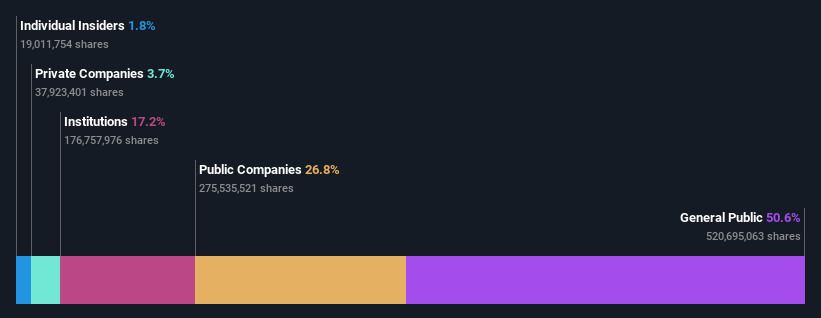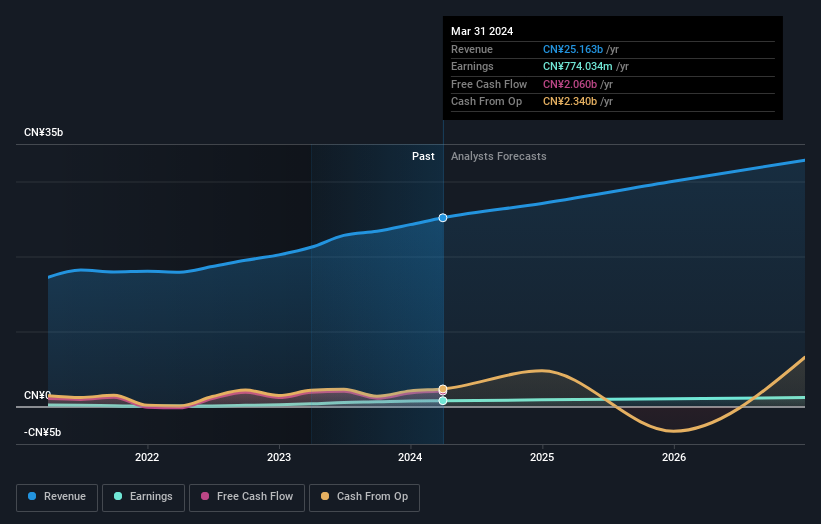- China
- /
- Consumer Durables
- /
- SZSE:000521
Retail investors among Changhong Meiling Co., Ltd.'s (SZSE:000521) largest stockholders and were hit after last week's 7.2% price drop

Key Insights
- Significant control over Changhong Meiling by retail investors implies that the general public has more power to influence management and governance-related decisions
- 49% of the business is held by the top 25 shareholders
- 17% of Changhong Meiling is held by Institutions
A look at the shareholders of Changhong Meiling Co., Ltd. (SZSE:000521) can tell us which group is most powerful. With 51% stake, retail investors possess the maximum shares in the company. Put another way, the group faces the maximum upside potential (or downside risk).
As a result, retail investors as a group endured the highest losses last week after market cap fell by CN¥845m.
In the chart below, we zoom in on the different ownership groups of Changhong Meiling.
Check out our latest analysis for Changhong Meiling

What Does The Institutional Ownership Tell Us About Changhong Meiling?
Institutional investors commonly compare their own returns to the returns of a commonly followed index. So they generally do consider buying larger companies that are included in the relevant benchmark index.
As you can see, institutional investors have a fair amount of stake in Changhong Meiling. This can indicate that the company has a certain degree of credibility in the investment community. However, it is best to be wary of relying on the supposed validation that comes with institutional investors. They too, get it wrong sometimes. It is not uncommon to see a big share price drop if two large institutional investors try to sell out of a stock at the same time. So it is worth checking the past earnings trajectory of Changhong Meiling, (below). Of course, keep in mind that there are other factors to consider, too.

We note that hedge funds don't have a meaningful investment in Changhong Meiling. Sichuan Changhong Electric Co.,Ltd. is currently the largest shareholder, with 27% of shares outstanding. Hefei Industrial Investment Holding Co., Ltd. is the second largest shareholder owning 3.7% of common stock, and National Council for Social Security Fund holds about 3.4% of the company stock.
On studying our ownership data, we found that 25 of the top shareholders collectively own less than 50% of the share register, implying that no single individual has a majority interest.
While it makes sense to study institutional ownership data for a company, it also makes sense to study analyst sentiments to know which way the wind is blowing. There is a little analyst coverage of the stock, but not much. So there is room for it to gain more coverage.
Insider Ownership Of Changhong Meiling
The definition of an insider can differ slightly between different countries, but members of the board of directors always count. The company management answer to the board and the latter should represent the interests of shareholders. Notably, sometimes top-level managers are on the board themselves.
Insider ownership is positive when it signals leadership are thinking like the true owners of the company. However, high insider ownership can also give immense power to a small group within the company. This can be negative in some circumstances.
We can see that insiders own shares in Changhong Meiling Co., Ltd.. It is a pretty big company, so it is generally a positive to see some potentially meaningful alignment. In this case, they own around CN¥182m worth of shares (at current prices). If you would like to explore the question of insider alignment, you can click here to see if insiders have been buying or selling.
General Public Ownership
The general public -- including retail investors -- own 51% of Changhong Meiling. With this amount of ownership, retail investors can collectively play a role in decisions that affect shareholder returns, such as dividend policies and the appointment of directors. They can also exercise the power to vote on acquisitions or mergers that may not improve profitability.
Private Company Ownership
It seems that Private Companies own 3.7%, of the Changhong Meiling stock. It might be worth looking deeper into this. If related parties, such as insiders, have an interest in one of these private companies, that should be disclosed in the annual report. Private companies may also have a strategic interest in the company.
Public Company Ownership
Public companies currently own 27% of Changhong Meiling stock. This may be a strategic interest and the two companies may have related business interests. It could be that they have de-merged. This holding is probably worth investigating further.
Next Steps:
While it is well worth considering the different groups that own a company, there are other factors that are even more important.
I always like to check for a history of revenue growth. You can too, by accessing this free chart of historic revenue and earnings in this detailed graph.
But ultimately it is the future, not the past, that will determine how well the owners of this business will do. Therefore we think it advisable to take a look at this free report showing whether analysts are predicting a brighter future.
NB: Figures in this article are calculated using data from the last twelve months, which refer to the 12-month period ending on the last date of the month the financial statement is dated. This may not be consistent with full year annual report figures.
New: AI Stock Screener & Alerts
Our new AI Stock Screener scans the market every day to uncover opportunities.
• Dividend Powerhouses (3%+ Yield)
• Undervalued Small Caps with Insider Buying
• High growth Tech and AI Companies
Or build your own from over 50 metrics.
Have feedback on this article? Concerned about the content? Get in touch with us directly. Alternatively, email editorial-team (at) simplywallst.com.
This article by Simply Wall St is general in nature. We provide commentary based on historical data and analyst forecasts only using an unbiased methodology and our articles are not intended to be financial advice. It does not constitute a recommendation to buy or sell any stock, and does not take account of your objectives, or your financial situation. We aim to bring you long-term focused analysis driven by fundamental data. Note that our analysis may not factor in the latest price-sensitive company announcements or qualitative material. Simply Wall St has no position in any stocks mentioned.
About SZSE:000521
Changhong Meiling
Operates in electrical machinery and equipment manufacturing industry in China and internationally.
Flawless balance sheet 6 star dividend payer.

